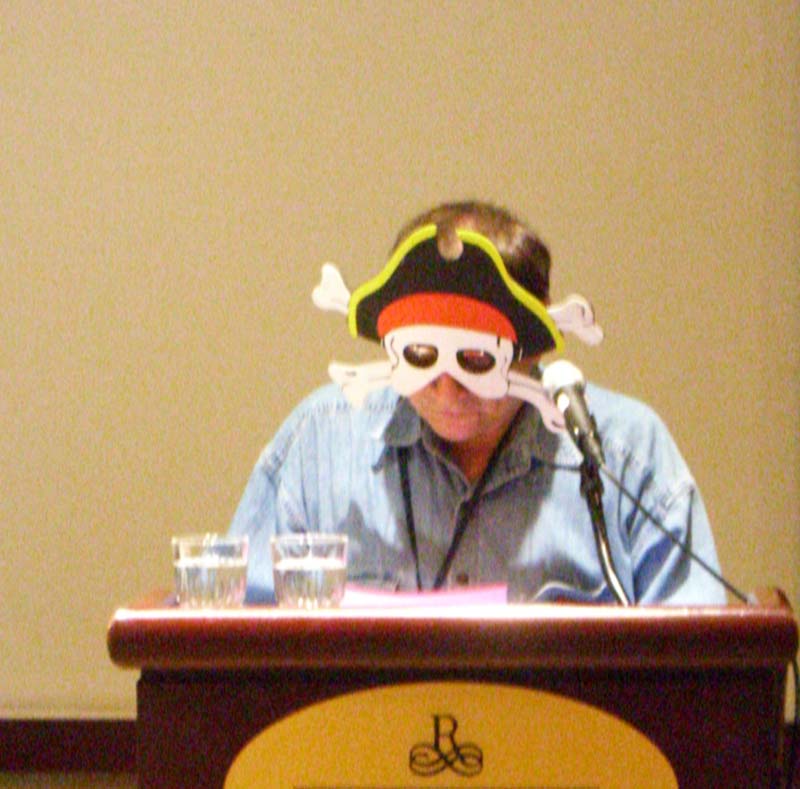World Fantasy Convention 2006: Explain This Book; Howard Waldrop reading; other Sunday pictures
Explain This Book
This panel was about books that are hard to understand and you wish someone explained them to you. We all have come across books like that, and that prompted a question, how many people out there read books that make them work? A closely related question was, how many people read books more than once?
To the latter, Lou Anders responded: “I’m an editor. I do not have time to read books twice.”. But another editor on this panel, Sharyn November does. Her example of books that she had re-read multiple times to understand were Pamela Dean books.
Left to right: editors Sharyn November and Anne Groell

Sharyn November. The first time I read one of her books I felt stupid. I felt I walked in the middle of something and I didn’t understand anything. So I said, your books make me feel dumb. She said, oh, I wrote them this way on purpose.
How many times when as a kid you read an adult book and you don’t quite get it? You have to re-read it again and again? That’s what she was aiming for. She can be so obscure that there is a website called Annotated Pamela Dean.
I asked, Pamela, do you like Greer Gilman‘s work? She said, I don’t understand her. You have to hear Greer reading it, and then you’ll understand it. Because it’s all in the language and cadences and pronunciation, and you have to hear how her voice changes.
Left to right: editors Sharyn November and Anne Groell, Matthew Bey

Matthew Bey. I like to work a lot while reading. I like experimental kinds of reading, that makes my brain turn, like listening to experimental music.
Sharyn November. You are a minority.
Anne Groell (who is also an editor). I’m exactly the opposite. I am a commercial fiction girl. I don’t particularly like literary fiction. I like genre. I don’t like books that are stupid or pointless, or don’t have anything to say, or don’t have message or meaning, but on the other hand, I don’t like to feel that I’m stupid. The best books or movies are the ones where you don’t have to work very hard, but you figure out something, and it gives you a sense of accomplishment! I’m clever, I noticed something!
She added that the movie “Memento” is an example of such a story: it makes you work to understand it, and makes you feel accomplished in the end for figuring it out.
Stephen Dedman. I work more, accept more experimentation in a short story. It’s when I have to work through an Umberto Eco story, which is basically a short story in 500 pages, then I feel I have to work too hard. But it’s better to feel a little dumb than to feel that the writer thinks you are dumb.
Anne Groell. A constant struggle for an editor is to make an author to put enough information in it so that it would be evident what the author is doing, but not have the author to repeat it 8 times. It’s a juggling act.
Left to right: Lou Anders and Stephen Dedman

Another example of a work of fiction that somebody had to ask somebody to explain came from Lou Anders. However, it was not a book but a science fiction movie “Primer”. “It is about kids that invent time travel in a storage facility. I watched it and could not understand it. I called Chris Roberson. He said, Oh, I called Ted Chiang, he explained it to me! It’s a sophisticated way to look at time travel [that Hollywood usually doesn’t do]. But is it a good narrative if you have to call Ted Chiang to explain it?”
The audience laughs. It becomes a running joke “Ask Ted Chiang”, that is uttered whenever someone in the audience or among the panelists asks somebody to explain a book to them.
Other examples of books that the panelists or people in audience didn’t understand or wanted them to be explained:
- The last two novels of Gene Wolfe’s “The Book of the New Sun”
- David Mitchell “Cloud Atlas”
- John Crowley “Little, Big”
Grá Linnaea, Jennifer Linnaea, and behind them, artist Charles Vess in the audience

Author Joe Haldeman in the audience or in the hallways

Just like every ArmadilloCon — Austin’s local science fiction convention — ends with a reading by the local SF/F author Howard Waldrop, so did the World Fantasy Convention. For reasons unknown (or lost to time), he read his work while wearing a pirate mask. Maybe the story was about pirates, I don’t remember now. Perhaps because of the mask, it was very difficult for me to make out the words. But the audience must have understood him, because they laughed repeatedly.
